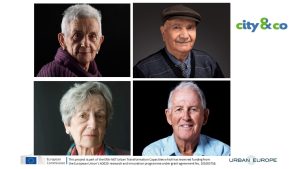Summary
AFCCQ is also available for use in North Macedonia in the Macedonian and Albanian languages
 To support age-friendly cities and communities and policymaking in North Macedonia, the AFCCQ has been translated into Macedonian and Albanian, and validated by Dr Daniel Pavlovski and Dr Elisabeta Bajrami Ollogu of Mother Teresa University.
To support age-friendly cities and communities and policymaking in North Macedonia, the AFCCQ has been translated into Macedonian and Albanian, and validated by Dr Daniel Pavlovski and Dr Elisabeta Bajrami Ollogu of Mother Teresa University.
In 2020, The Hague launched the first quantitative assessment tool for measuring age-friendliness – the AFCCQ (Age-Friendly Cities and Communities Questionnaire). This instrument consists of 23-items that can assist scholars, municipalities and local authorities to collect baseline data relating to their town or city to understand how age-friendly their local community is.
In 2022, external funding was awarded by the Taskforce for Applied Research, as part of ERA-NET Cofund Urban Transformation Capacities (ENUTC) for the project – City&Co: Older Adults Co-Creating a Sustainable Age-friendly City. As a member of COST Action NET4Age-Friendly, Dr Pavlovski of Mother Teresa University joined forces of the City&Co consortium and validated the AFCCQ for use in the multi-ethnic and multi-cultural city of Skopje, the capital of North Macedonia.
The North Macedonian versions of the AFCCQ can be found here: W2404 0720 Questionnaire Macedonisch V3 and 2024 AFCCQ Albanian language.
The paper on the validation of the instrument in Skopje can be found here: How older adults experience the age-friendliness of Skopje: Results of the validation of the AFCCQ for use in North Macedonia and a representative survey – ScienceDirect
 AFCCQ is also available in the Japanese language
AFCCQ is also available in the Japanese language
According to the World Economic Forum, Japan has the oldest population in the world. More than 1 out of 10 people are aged 80 years or over in 2023. To support age-friendly cities and communities and policymaking in the country, the AFCCQ has been translated into Japanese and validated by a Japanese consortium.
The full AFCCQ can be found here: AFCCQ in Japanese language.
AFCCQ available in the English, Dutch and Romanian language
Update April 2024
The Age-Friendly Cities and Communities Questionnaire is being validated and used in multiple countries. For now the following – validated – AFCCQ’s are available in:
- English: Agefriendly Cities Questionnaire
- Dutch: AFCCQ in Dutch language
- Romanian: AFCCQ in Romanian language
The AFCCQ can be used for research purposes with reference to the source: https://www.mdpi.com/1660-4601/17/18/6867/pdf.

 Update September 2023
Update September 2023
Validation of the AFCCQ: full speed ahead
In 2020, The Hague launched the first quantitative assessment tool for measuring age-friendliness – the AFCCQ (Age-Friendly Cities and Communities Questionnaire). This instrument consists of 23-items that can assist scholars, municipalities and local authorities to collect baseline data relating to their town or city to understand how age-friendly their local community is. The original AFCCQ is available in Dutch and British English.
In 2022, external funding was awarded by the Taskforce for Applied Research, as part of ERA-NET Cofund Urban Transformation Capacities (ENUTC) for the project – City&Co: Older Adults Co-Creating a Sustainable Age-friendly City – in collaboration with the Jagiellonian University in Kraków (Professor Perek-Białas),the Wrocław University of Environmental and Life Sciences (Professor Kazak) and the National University of Political Studies and Public Administration (Dr Ivan) in Bucharest in order to cross-culturally validate the AFCCQ for use in Poland and Romania. Additionally, and concurrently, Dr Özer and her team from Istanbul Sabahattin Zaim University in Turkey were conducting the validation of the AFCCQ and the Turkish version was published in 2022.
Across the three validation sites (Poland, Romania, Turkey) to date, findings are demonstrating successful and positive insights that the AFCCQ tool can be used at a national level. This sets out the pathway to impact of this work enabling municipalities, local authorities and researchers the opportunity to measure age-friendliness in a specific area, with a view to changing strategic resources, planning and decision making to enhance the physical environment better for all residents.
Further validations have followed in 2022 across different countries. In North Macedonia, work is led by Dr Pavlovski at the University Mother Teresa in Skopje. Dr Barrie and Professor Soebarto are leading the Australian version of the AFCCQ and are based at the University of South Australia and the University of Adelaide in Adelaide, Australia respectively. All sites are aiming to validate the AFCCQ for use in the multi-cultural cities of Skopje and the Greater Adelaide Metropolitan area. Professor Ziganshina from the Kazan State Medical University has validated the AFCCQ in Tatarstan located in the Russian Federation employing an intergenerational approach.
Additional teams and collaborations have been undertaken across Europe and the Middle East. Initially, a team from Portugal, led by Dr Barata of the Instituto Superior Miguel Torga in Coimbra, is currently undertaking the validation process for the Portuguese version of the AFCCQ. And in Israel, the Hebrew version of the AFCCQ is led by Professor Ayalon from Bar Ilan University, who has collected data from four Israeli cities (Tel Aviv, Kfar Saba, Netanya, Jerusalem). Similarly, an Italian version of the AFCCQ is underway and is led by Dr Bertani of the Ca’ Foscari University of Venice. Data collection is currently underway across three Italian cities, Venice, Verona, and Naples, in order to validate the AFCCQ for use in Italy. A Great Britian and Ireland version of the AFCCQ is currently underway and led by Dr Marston from The Open University in Milton Keynes in the United Kingdom. She is conducting a nationwide validation for the AFCCQ and findings are anticipated in early 2024.
A further two more validations are being undertaken by PhD candidates: Ms. Aija Ozola of Riga Stradins University is working on a Latvian version of the AFCCQ, and Mr. Tang Linxi of Universiti Sains Malaysia is coordinating the validation of the AFCCQ for the People’s Republic of China Shandong Province.
We are excited to report that there are more countries who are expected and we invite scholars to join this consortium and joint collaboration effort to validate the AFCCQ in their country.
Reference: Özer, G. Bahçecioğlu Turan & N. Teke (2022) Agefriendly cities and communities questionnaire: A research on Turkish validity and reliability. Archives of Environmental & Occupational Health, DOI: 10.1080/19338244.2022.2061397
Launch of the AFCCQ
In early 2020, the municipality of The Hague awarded the consortium consisting of The Hague University of Applied Sciences, Hulsebosch Advies and AFEdemy to develop a questionnaire and run a representative survey on the perceived age-friendliness of the city among its older citizens. Part of this survey was the development of a validated questionnaire, which allows for an assessment of perceived age-friendliness. To do justice to the super-diversity of the population of The Hague, the municipality also wanted a representative number of older Western and non-Western immigrants to be included in the sample.
The consortium developed and validated a total of 64 questions to measure the whole construct of age-friendly cities. The result is the AFCCQ with 23 questions. More information: The questionnaire is free to use in Dutch and English. It might be necessary to validate it culturally.
Key facts
Main target group: Older people in general
Sector(s): Health, Housing, Information and communication, Long-term care, Transportation, Urban development
Other sector(s): social inclusion
Desired outcome for older people:
Learn, grow and make decisions
- Ageism
- Accessibility
- Ageing in place
- Inclusion
- Participation

